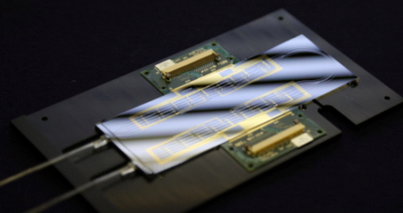Optical chip allows for reprogramming quantum computer in se
Source: University of Bristol
 Linear optics processor (credit: University of Bristol)
Linear optics processor (credit: University of Bristol)
A fully reprogrammable optical chip that can process photons in quantum computers in an infinite number of ways have been developed by researchers from the University of Bristol in the UK and Nippon Telegraph and Telephone (NTT) in Japan.
The universal “linear optics processor” (LPU) chip is a major step forward in creating a quantum computer to solve problems such as designing new drugs, superfast database searches, and performing otherwise intractable mathematics that aren’t possible for supercomputers ― marking a new era of research for quantum scientists and engineers at the cutting edge of quantum technologies, the researchers say.
The chip solves a major barrier in testing new theories for quantum science and quantum computing: the time and resources needed to build new experiments, which are typically extremely demanding due to the notoriously fragile nature of quantum systems.
DIY photonics
“A whole field of research has essentially been put onto a single optical chip that is easily controlled,” said University of Bristol research associate Anthony Laing, PhD, project leader and senior author of a paper on the research in the journal Science today (August 14).
“The implications of the work go beyond the huge resource savings. Now anybody can run their own experiments with photons, much like they operate any other piece of software on a computer. They no longer need to convince a physicist to devote many months of their life to painstakingly build and conduct a new experiment.”

Linear optics processing system (credit: J. Carolan et al./Science)
The team demonstrated that by reprogramming it to rapidly perform a number of different experiments, each of which would previously have taken many months to build.
“Once we wrote the code for each circuit, it took seconds to reprogram the chip, and milliseconds for the chip to switch to the new experiment,” explained Bristol PhD student Jacques Carolan, one of the researchers. “We carried out a year’s worth of experiments in a matter of hours. What we’re really excited about is using these chips to discover new science that we haven’t even thought of yet.”
The University of Bristol’s pioneering Quantum in the Cloud is the first service to make a quantum processor publicly accessible. They plan to add more chips like the LPU to the service “so others can discover the quantum world for themselves.”
Abstract of Universal linear optics
Linear optics underpins fundamental tests of quantum mechanics and quantum technologies. We demonstrate a single reprogrammable optical circuit that is sufficient to implement all possible linear optical protocols up to the size of that circuit. Our six-mode universal system consists of a cascade of 15 Mach-Zehnder interferometers with 30 thermo-optic phase shifters integrated into a single photonic chip that is electrically and optically interfaced for arbitrary setting of all phase shifters, input of up to six photons, and their measurement with a 12-single-photon detector system. We programmed this system to implement heralded quantum logic and entangling gates, boson sampling with verification tests, and six-dimensional complex Hadamards. We implemented 100 Haar random unitaries with an average fidelity of 0.999 ± 0.001. Our system can be rapidly reprogrammed to implement these and any other linear optical protocol, pointing the way to applications across fundamental science and quantum technologies.
| }
|